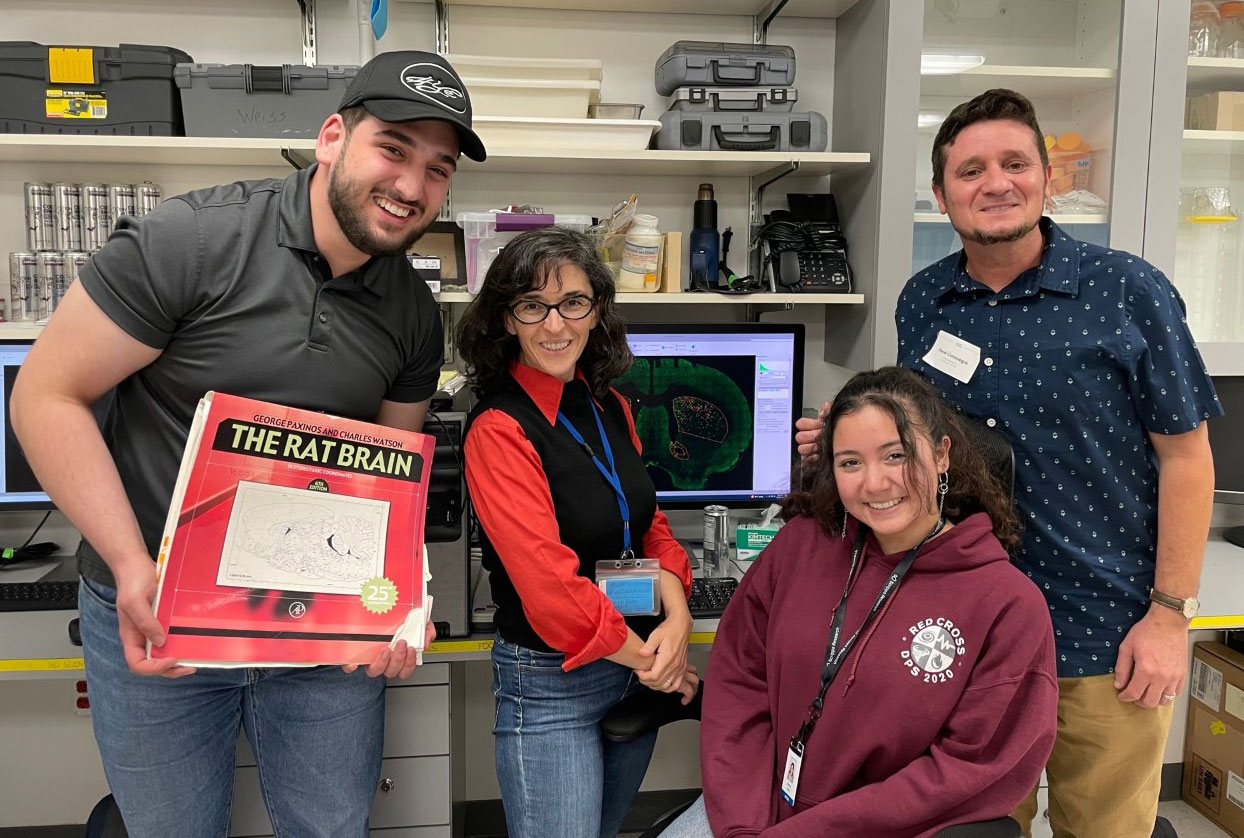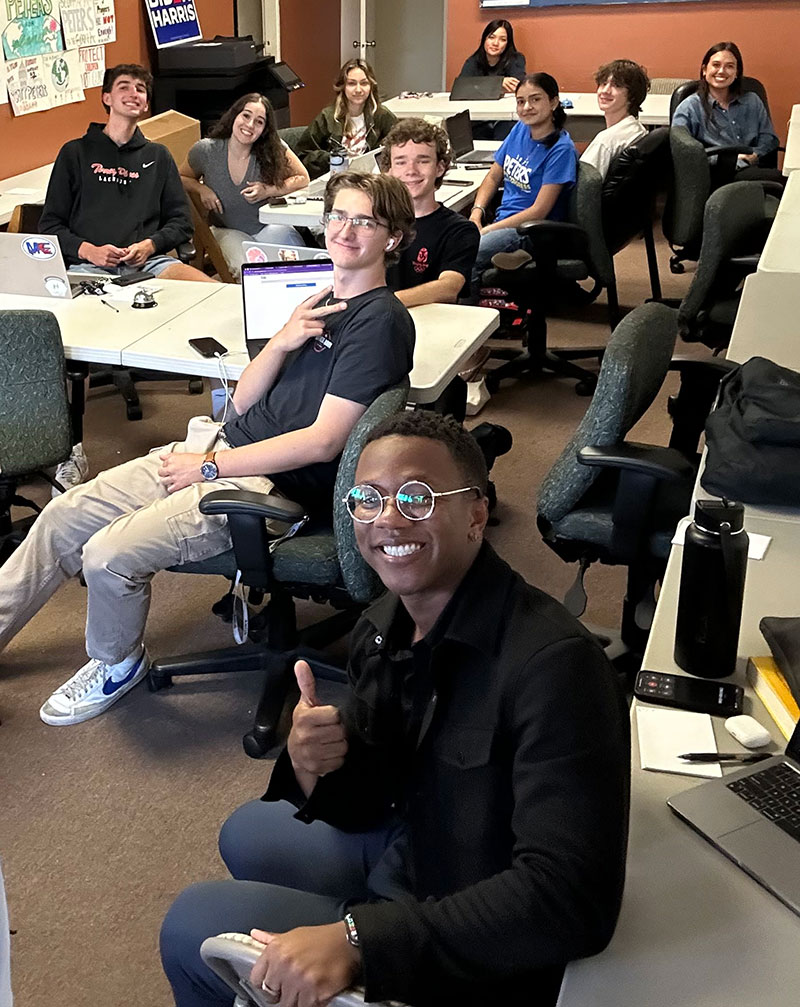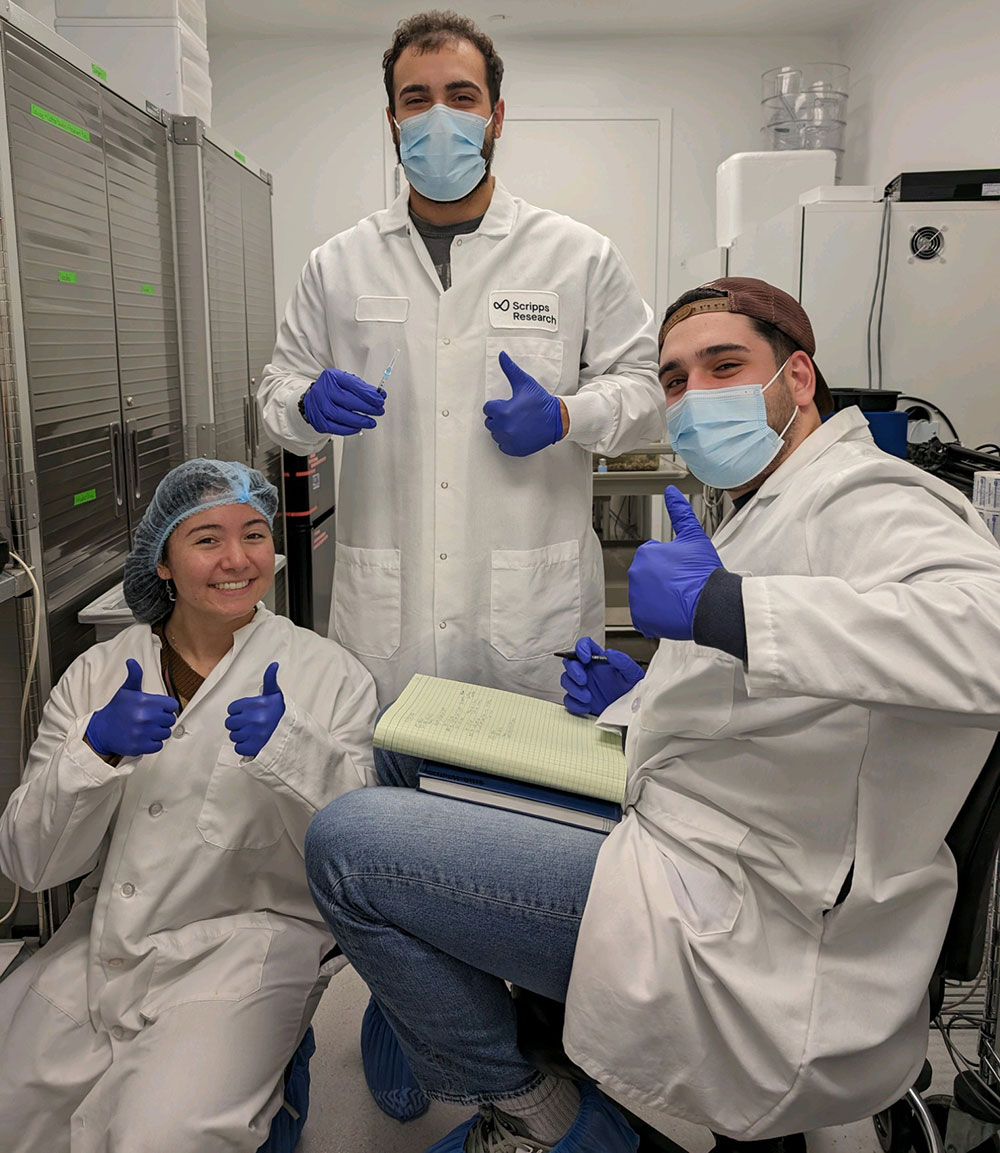
Lexi Grey knew she wanted to go into the medical sciences ever since her father died of cancer when she was 5 years old. An internship at the Scripps Research lab in La Jolla, which she obtained while a student at San Diego Mesa College, helped her realize she wanted to focus on the science of the brain.
During her two-year internship, Grey participated in research studying the effects of alcohol addiction on the brains of rats. She gave a presentation in 2024 during the Society for Neuroscience conference in Chicago and will be listed as a researcher in a paper to be submitted to scientific journals.
Grey transferred to Johns Hopkins University, her dream school, and is pursuing a doctorate and medical degree in neurology. She said her bright future is all because she learned about the Mesa Impactship Program from Mesa College’s Internship Coordinator, Pavel Consuegra.
“At Mesa, I had the opportunity to support my passions,” Grey said. “I know I would not be here at Johns Hopkins without the support of Pavel getting me connected to doing research.”
Grey is one of many students within the San Diego Community College District who have benefited from an internship.
“The more hands-on experience that students have related to the careers and subject areas they are interested in, the more likely they are to confirm they actually like that work and get jobs in that field of study,” said Amertah Perman, SDCCD’s dean of Career Education and Workforce Development. “Employers are looking for students with experience, and an internship is the primary way to get that experience.”
The SDCCD’s three credit colleges, San Diego City, Mesa, and Miramar, all offer students some form of work experience, which awards college credit for Work-Based Learning. With a recent change in federal regulations, San Diego College of Continuing Education, the District’s noncredit college, is now able to provide formal internship opportunities and is beginning to build out a local infrastructure, said Andrei Lucas, dean of Automotive, Skilled and Technical Trades at College of Continuing Education.
MIP Supports Student Interns

Launched in fall 2022, the Mesa Impactship Program empowers students by providing hands-on industry experiences through internships, volunteering, and Directed Clinical Practice. The program helps students explore careers, develop professional skills, and gain workforce training, with a strong focus on underserved student populations. Students who secure an internship through MIP are eligible to receive a one-time $1,000 payment to help cover expenses such as childcare, equipment, fees, meals, and professional attire while they are working.
The program was first initiated through leveraging the state’s Learning-Aligned Employment Program, which was established in the 2021-22 California budget. It was created as a 10-year program but was abruptly canceled in the 2024-25 state budget.
In another blow to funding, the state this year reduced the Strong Workforce Program, which supports career education in the state’s 116 community colleges. The reduction in SWP funds is impacting instructional and student services that are key to ensuring programs are aligned with industry needs and that students are prepared for the workforce. SDCCD and other colleges across the state are advocating with state legislators to reinstate the $60 million that was cut from the SWP budget.
“It’s a critical need,” she said. “We need to see increases and not cuts.”
The MIP program has served more than 700 students since its inception and has developed relationships with 200 employers. Students earn college credits based on their hours of work experience. More than 50% of overall program participants have been adult learners, and, of the 191 students in the spring 2025 cohort, 48% were first-generation college students.
Consuegra, Mesa College’s internship coordinator, said the college continues to explore various funding sources to offer stipends to student interns from specific populations, such as undocumented students or veterans.
Mesa College student Angel Wilson obtained three internships to help prepare him for a career in the law: one at the Alternate Public Defender’s Office, a second with U.S. District Judge John A. Houston, and a third in the office of Congressman Scott Peters.
Wilson said the $1,000 he received from Mesa College paid for the suits he needed for the work, plus gasoline to get to the jobs, and other expenses. He’s hoping to continue having internships as he transitions his education to a four-year university and then law school.
“The experience that I’ve garnered has really set me apart,” he said. “By the time I graduate law school, I’m going to have six years of experience under my belt. Hopefully, it will make me a better student, a better person, and a better attorney.”
Shawn Fawcett, Work-Based Learning coordinator at Mesa College, said SDCCD is committed to helping students with their internships so they can pursue their career goals.
“We all believe in this work,” she said. “We see the potential in each student.”
Districtwide Work Experience Programs

While the MIP program offers a wide range of internships for students, there also are Work Experience programs at all SDCCD colleges across a variety of majors.
For example, Miramar College offers work experience for students in child development, business, exercise science, aviation, and paralegal programs. Many of those fields require students to have work experience to get licensing or certification, said Kyoka Hashimoto, Miramar College’s faculty Work Experience program coordinator. Other students, she said, are already employed in the career field and want to earn college credit for the work they are doing. While faculty members help students find internships, most students find the internships on their own, Hashimoto added.
One avenue for students to find internships is through Handshake, a districtwide job board. The free app-based service allows students to search by industry for jobs or internships. The SDCCD recently received an award from Handshake for setting the standard in collaborating with business and industry to benefit students.
While Miramar College students get college credit for participating in internships, many remain unpaid. Support is provided in other ways, including having an instructor work with student interns, which Hashimoto said is a valuable experience.
“You are not alone. You are doing this with the guidance of a professional who’s in the business,” she said. “They have a cheerleader to guide them along.”
In fall 2024, Miramar College started a new program offering work experience credit for 16 servicemembers who are being held in the Marine Corps Air Station brig. To earn college credit, the military personnel are performing a wide variety of jobs, such as one who is creating a spreadsheet showing overstocked and understocked items in the brig.
“It’s life skills that these students need once they get out and come into the workforce,” Hashimoto said. “It builds a lot of confidence in the students.”
The Work Experience program at City College also focuses on specific majors, including business, child development, sustainable agriculture, and graphic design, said Nicole Vargas, faculty Work Experience coordinator.
Although almost all internships at City College are unpaid, the college is partnering with Yo Soy STEM, which is supported with federal grant money, to offer paid internships to Latinx and low-income students beginning in the spring semester. About 40 interns a year will be paid through the federal grant, she said.
Vargas said internships show students how to apply what they have learned in the classroom.
“The magic happens when they can see the results in a professional setting,” she said. “It’s building a bridge from the educational experience to a career.”
Advocating for Paid Internships

Growth in Work Experience programs for community college students is limited without paid placements. As a District responsible for a $5.8 billion impact on the local community — 80% of which comes from alumni who stay to work in the area — representatives from the SDCCD visited Sacramento in March to advocate for Assembly Bill 323. The bill, introduced by Assembly Higher Education Committee Chair Mike Fong in early 2025, would require the California Community Colleges Chancellor’s Office to revise policies, regulations, and guidance necessary to provide students, employers, or both with paid work-based learning opportunities.
Currently, community college districts cannot use Strong Workforce funds to support students with paid internships. In a letter of support from the SDCCD to change that policy through AB 323, Chancellor Gregory Smith advocated “it could enable students to gain practical experience in their field of study while earning a wage, and it could allow employers to access a pool of skilled and motivated workers. The bill would also authorize a community college district to use funding allocated in the Strong Workforce Program to directly support students, employers, or both, for paid work-based learning to increase employability and employment.”
According to recent data, students participating in work-based learning are more likely to complete their degrees and have higher success rates. At City College, students participating in work-based learning are 12% more likely to complete and have 7% higher course success rates than those who are not participating in work-based learning.
Perman, who recently spoke in Sacramento on behalf of the District and California community college students, said that many SDCCD students must support their families while attending community college. They cannot cut paid work hours for unpaid internship experience, but often their current part-time job is not aligned with their career or academic goals. Access to paid internships can change that dynamic.
“If they are unable to get paid placements, that’s cutting into their opportunity to either go to school or earn wages,” she said. “For our students to be successful in the field, they need paid internships. That’s the most equitable opportunity for them to become competitive for the jobs they are seeking for their career goals.”